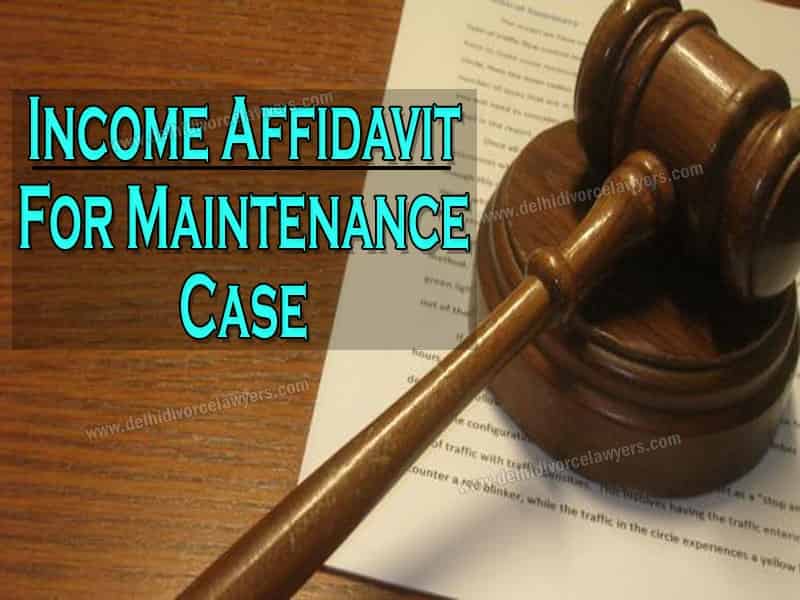THE AMENDMENTS INTRODUCED IN INCOME AFFIDAVIT
IN
KUSUM SHARMA V. MAHINDER KUMAR SHARMA
The Delhi High Court in Kusum Sharma v. Mahinder Kumar Sharma modified the format of assets, income and expenditure that has to be led by both the parties, at the very threshold of matrimonial litigation. In its judgment, single bench of Justice JR Midha has modified the format by incorporating International Best Practices alongside important questions and documents contained in the formats previously prescribed by the High Court.
Filing of comprehensive format of assets, income and expenditure in matrimonial cases is essential to determine the maintenance. In this backdrop the High Court expressed that mandatory filing of the affidavit by the parties should be incorporated in the statutes, as is done in the developed countries.
The modified directions/guidelines issued by the Hon’ble High Court shall apply to all matrimonial cases including cases under Hindu Marriage Act, 1955; Protection of Women from Domestic Violence Act, 2005; Section 125 Cr.P.C.; Hindu Adoption and Maintenance Act, 1956; Special Marriage Act, 1954; Indian Divorce Act, 1869; Guardians and Wards Act, 1890 and Hindu Minority and Guardianship Act, 1956.
The modified affidavit requires the parties to disclose the following information:
- In case of a salaried person—
Particulars of his employment including salary, D.A., commissions, incentives, bonus, perks, perquisites, other benefits, income tax etc.
- In case of a self-employed person—
The nature of business/profession, share in the business, net worth of the business, number of employees, annual turnover/gross receipts, gross profit, Income Tax, net income and regular monthly withdrawal/drawings from the business.
- Income from other sources—
Agricultural income, rent, interest on bank deposits and other investments, dividends, mutual funds, annuities, profit on sale of movable/immovable assets etc.
- Particulars of immovable properties—
Financial assets including bank accounts DEMAT accounts, safety deposit lockers; investments including FDRs, stocks, shares, insurance policies, loans, foreign investments;
- Particulars of movable assets—
Motor vehicles, mobiles, computer, laptop, electronic gadgets, gold, silver and diamond jewellery etc.; intangible assets; garnishee(s)/trade receivables; corporate/business interests; disposal and parting away of properties; properties acquired by the family members, inheritance.
- Standard of living and lifestyle—
Credit/debit cards, membership of clubs and other associations, loyalty programs, social media accounts, domestic helps and their wages, mode of travel in city and outside city, category of hotels, category of hospitals for medical treatment, frequency of foreign travel, frequent flyer cards, brand of mobile, wrist watch, pen, expenditure ordinarily incurred on family functions, festivals and marriage of family members etc.
- Expenditure—
On housing, household expenditure, maintenance of dependents, transport, medical expenditure, insurance, entertainment, holiday and vacations, litigation expenses, discharge of liabilities, etc.
The Court has clarified that affidavits of both the parties should be taken on record \”simultaneously\”.
THE ANNEXURE HAS BEEN DIVIDED INTO THE FOLLOWING PARTS:
- PERSONAL INFORMATION RELATING TO THE DEPONENT
S.NO.1-19
- RELEVANT INFORMATION RELATING TO THE SPOUSE
S.NO.20-27
- RELEVANT INFORMATION RELATING TO THE CHILDREN
S.NO.28-34
- STATEMENT OF INCOME
S.NO.35-41
- STATEMENT OF EXPENDITURE
S.NO.42-54
- STATEMENT OF ASSETS
S.NO.55-65
- GENERAL INFORMATION RELATING TO THE STATUS,
STANDARD OF LIVING AND LIFESTYLE
S.NO.66-82
- DOCUMENTS
S.NO.83-89
- DOCUMENTS RELATING TO INCOME AND ASSETS
S.NO.90-99

